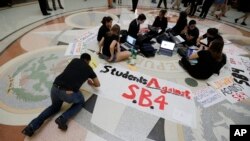A federal appeals court in New Orleans planned to hear arguments Tuesday on a Texas law cracking down on so-called sanctuary cities.
The Texas Legislature approved the law in the spring. It was challenged by several Texas city governments and civil rights advocates. It requires local law enforcement agencies to honor federal immigration requests to detain people in local jails for possible deportation.
Opponents go before the 5th U.S. Circuit Court of Appeals on Tuesday afternoon, seeking an injunction blocking enforcement pending further court proceedings. Texas officials will argue against an injunction and in favor of the law.
The law also allows police to inquire about people's immigration status during routine interactions such as traffic stops. It subjects some law enforcement officials with removal from office and criminal charges for not complying with federal detainer requests.
Municipal officials from Dallas, Houston, El Paso, San Antonio and Austin are among the opponents. The American Civil Liberties Union is fighting the law on behalf of the small Texas border city of El Cenizo. The Mexican American Legal Defense and Educational Fund is representing other localities.
President Donald Trump's administration backs the law. The U.S. Justice Department has joined Texas in defending it.
Opponents argue, among other things, that the law illegally puts local law enforcement officers in the role of federal immigration officers; that it puts local officers in the position of violating detainees' constitutional rights against illegal search and seizure. The critics also argue that some parts of the law are unconstitutional because they are vague as to exactly how local officers are to fulfill their duties with respect to immigration law.
Tuesday's arguments mark the second time in as many months that 5th Circuit judges will hear arguments in the case. After U.S. District Judge Orlando Garcia judge blocked much of the law on Aug. 30, Texas sought an emergency order allowing enforcement. A three-judge 5th Circuit panel heard arguments on Sept. 22 while immigrant advocates beat drums and chanted outside the federal courthouse in New Orleans. Days later the panel eased restrictions on enforcement of the law with a complex order that was interpreted differently by both sides.
Judges on the panel assembled for Tuesday's arguments: Jerry E. Smith and Edith Jones, nominated by President Ronald Reagan; and Edward Prado, by President George W. Bush.




